They graduated years apart, yet each embraces the Jesuit magis, a calling to "be more" that has fueled Holy Cross men and women throughout the decades and around the world. Determined to live lives of purpose and impact, these alumni have leveraged their success, influence and expertise to support truth, justice and equality of opportunity. They include:
- A world-renowned nuclear physicist and pioneering researcher who stands as a testament to the great power, significant value and expansive sweep of a liberal arts education.
- A courageous, passionate and uncompromising foreign journalist who uses her voice and frontline presence to report with clarity and conscience from global hotspots.
- An independent and impartial federal judge who speaks truth to power in rulings as historic as they are complex.
- An unequalled advocate, practitioner and educator who supports the most vulnerable children among us.
- A visionary physician and researcher who saw the life-saving potential of technology for detecting heart disease and transformed medical training, patient care and cardiac outcomes.
On Sept. 21, Augustine J. Caffrey, Ph.D. '73, Mary Beth Sheridan '83, Hon. Richard J. Leon '71, Barbara Tylenda, Ph.D., ABPP '79 and Arthur E. Weyman, M.D., '62 were honored as recipients of the 21st Sanctae Crucis Awards, the highest non-degree honor the College bestows on alumni who have distinguished themselves professionally and dedicated their lives to justice in a variety of ways.
While their backgrounds and fields are varied, all five recipients share a common foundation on Mount St. James, one that has influenced their journey in unexpected ways.
Augustine J. "Gus" Caffrey, Ph.D. '73
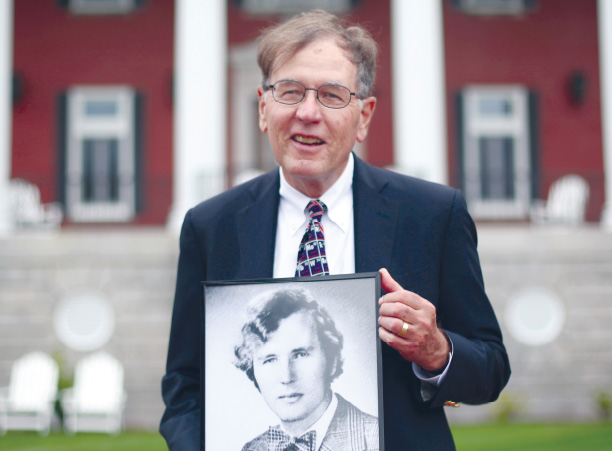
"As a man of science with a consuming interest in history, you stand tall as a testament to the great power, significant value and expansive sweep of a liberal arts education."
Augustine J. "Gus" Caffrey, Ph.D. '73 is a world-renowned nuclear physicist, pioneering researcher and visionary inventor. An international authority on gamma ray and neutron spectroscopy, he's known by his peers as a generous collaborator, inspiring mentor and exemplary team-builder. Throughout his illustrious career of nearly four decades at the U.S. Department of Energy's Idaho National Laboratory (INL), he has focused on "the assessment of dangerous things you'd rather not open." And he remains inspired by his Jesuit liberal arts education always to do more.
In the early 1990s, Caffrey led an award-winning research and development team at INL, an endeavor that resulted in the Bay State native's signature technology, an innovative chemical analysis system, the Portable Isotopic Neutron Spectroscopy system (PINS). PINS "sees" through steel casings, using neutrons to identify potential explosives, chemical warfare agents or otherwise harmful materials within munitions or containers. The object under test need not be opened or even touched; the PINS instrument nondestructively determines the contents of unexploded munitions. The patented system also protects human life through a simple computer interface that allows the operator to remain at a safe distance.
In recognition of his innovative work, Caffrey received an R&D 100 Award in 1992, the INL Lifetime Achievement Award in 2012 and the INL Inventor of the Year Award in 2014. He received his lab's highest honor in 2015 when he was named an Idaho National Laboratory Fellow. An original member of the U.S. Army Munitions Assessment Review Board, he has consulted for the International Atomic Energy Agency and served on two national Energy Department panels. His scientific output is highly cited, and his publications top 100.
Caffrey considers scientific research a team sport and was inspired by Dan Kennedy '68, who managed the staff at WCHC, Holy Cross' radio station. "Dan is my role model for managing a team," he says. "We were just a bunch of volunteers, but he taught us by example to get along with everyone and to make every team member feel valuable."
That lesson in teamwork was amplified during Caffrey's military service, which took him away from campus from 1969-1971. "In the Army, I learned to respect people of different backgrounds because everyone in a platoon brings something to help complete the mission," he notes. Caffrey's parents also imparted their values by example. "We all took pleasure in learning on our own, working hard and working independently," he says, lessons that translated well when he arrived at Holy Cross.
His father, the late Hon. Andrew Caffrey '41, chief judge of the U.S. District Court in Boston, gave "rather firm direction regarding where my brothers and I would go to college," Caffrey says. Brothers Andrew '71, James '73 and Joseph '81 also followed their father to Mount St. James. Caffrey's extended family of Crusaders also includes brother-in-law David Boison '74, sister-in-law Camilla '81 and nephew Daniel Boison '06.
At age 7, Caffrey was probably one of the youngest subscribers to Popular Mechanics, a gift from his grandfather, who sensed the first-grader's early interest in science and how things work. By the late 1950s, the Space Race momentum, accelerated by the successful launch of Russia's Sputnik satellite, underscored the wondrous possibilities of discovery. "Kids who showed the slightest interest in science back then got great encouragement," he says. Physics became a passion when he was a high school senior: "I decided then that physics would be my life's work."
At Holy Cross, the late Edward F. Kennedy, physics department chair, and Melvin Tews, mathematics professor emeritus, became Caffrey's lifelong role models: "I stayed in touch with Ed Kennedy until he passed away in 2017. Professor Tews had such a good sense of whether or not students were understanding the material. I have modeled my teaching on his."
After graduation, Caffrey went on to earn a doctorate in physics from Johns Hopkins University. He and his wife, Adele, headed west for his new job at INL in Idaho Falls, where they raised their children, David and Anna. Retirement in 2016 brought emeritus status at the lab, which allows him to keep an office, retain his security clearance and maintain an active research agenda. Caffrey appreciates every opportunity to be outdoors, revels in his proximity to Yellowstone National Park and looks forward to visits from friends and family, especially his grandchildren.
"I think finding your life's work comes from within," Caffrey says. "Your work needs to be coupled to your interests. Rev. Raymond J. Swords, S.J., then-president of Holy Cross, spoke these words to my entering class: 'Now is the time to live your dreams.'"
Mary Beth Sheridan '83
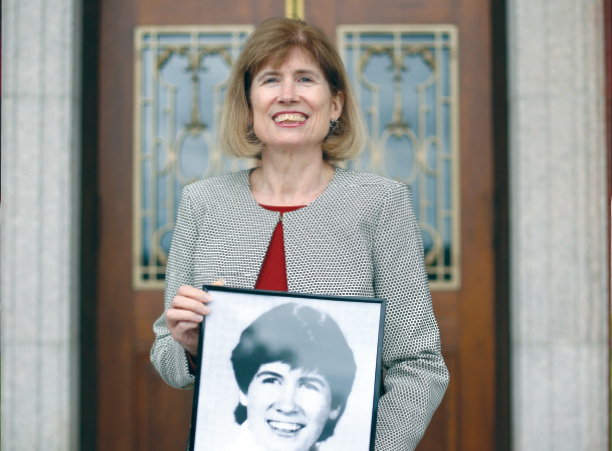
"You live the Jesuit ideal of a woman for others whose faith and high purpose are revealed in your reverence for truth, advocacy for human rights and respect for the dignity of every person."
Throughout her career spanning more than three decades, award-winning journalist Mary Beth Sheridan '83 has dedicated herself to lighting up the truth, infusing human dimension into grand-scale issues and upending wrongs with meticulous research and well-chosen words. She has traveled the world to report from the perilous frontlines of war, the dark recesses of human suffering and the thin margins of harrowing poverty. The Washington Post correspondent and former deputy foreign editor was part of a team whose series of articles on the United States' post-9/11 war on terrorism was cited as "exhaustive and illuminating," bringing recognition as finalists for a 2006 Pulitzer Prize Public Service Award.
Sheridan credits her Holy Cross experience for preparing her to write with clarity, confidence and compassion while reporting on the run. "The College deepened my faith and my sense of idealism, which has been important in my work," she says. "I think that the value of a liberal arts education is as strong as ever. I learned to think critically, to write, to debate, to get to the core of the issue. You come away from a Holy Cross education with a sense of mission, of wanting to do your part to make the world a little bit better."
A nonstop career in up-close-and-personal international reporting can carry inevitable risks. Even as a young reporter, Sheridan did her job from dangerous places. She covered human rights struggles in the midst of drug war violence in Colombia. She was embedded with a U.S. Army helicopter unit ready to launch an attack during the 2003 invasion of Iraq. She was even briefly kidnapped in Mexico. "It's important to have fear and to respect it when you're in a dangerous situation," she explains. "Without fear, you can become a danger to yourself and those around you."
Sheridan took a circuitous route to journalism. "I planned to go to law school after graduation," the English major explains. But she was the second of five children who were close in age and needed money for college. She soon discovered that "there were no scholarships for future lawyers, but there were for future journalists." The former high school newspaper editor received an annual scholarship from the Scripps Howard Foundation in support of journalistic excellence; she joined The Crusader staff and reported for her hometown newspaper during breaks.
By senior year, the prospect of law school no longer excited her, but becoming a journalist did. Her change of heart found its footing through the counsel of her Holy Cross adviser and mentor, Helen Whall. The English professor, now emerita, encouraged Sheridan to choose a career that embraced her passion. A study-abroad experience in England also weighed heavily in her decision to abandon the thought of law school. "My year in England was life-changing," she says. "I was discovering the world and experiencing other cultures from the inside out. I knew that I wanted to go to Spain and become a foreign correspondent."
After graduation, Sheridan moved to Spain. "I decided to give myself a 'gap year,'" she notes. "If it didn't work out, at least I would be fluent in Spanish and have had this tremendous experience. Too often people are pressured after graduation to lower their expectations and to be more pragmatic. I think it's a time to give yourselves permission to take risks and to experience life as fully as possible. Have a Plan A and a Plan B. Do everything possible to make Plan A work before you pivot to Plan B."
Sheridan cobbled together jobs in Madrid as an English tutor and as a freelance reporter, and was eventually hired part time by the Associated Press bureau there. That led to a staff job with AP in New York, and then, a few years later, an assignment as a correspondent in Italy. Based in Rome for four years, she learned Italian and reported on the country's madcap politics, the Mafia, and the Vatican, traveling with Pope John Paul II.
She moved to Colombia as a Latin America correspondent for the Miami Herald, followed by five years with the Los Angeles Times, based in Mexico City.
"I was inspired by the people — including journalists, lawyers and human rights activists — who sacrificed so much to bring justice and democracy to their countries," she says. "I wanted to contribute something meaningful as a journalist by telling about their struggles."
Sheridan joined The Washington Post in 2001. By 2009, she was covering the U.S. Department of State and traveling regularly with then-Secretary Hillary Clinton. As a news editor in 2012, she was awarded a prestigious yearlong Nieman Fellowship at Harvard University, where she studied international politics with a focus on Latin America. She was named the Post's deputy foreign editor in 2015, a role she held through November 2018, when she returned to Mexico — her favorite foreign country — as a correspondent, where she's continuing the reporting she loves.
Hon. Richard J. Leon '71
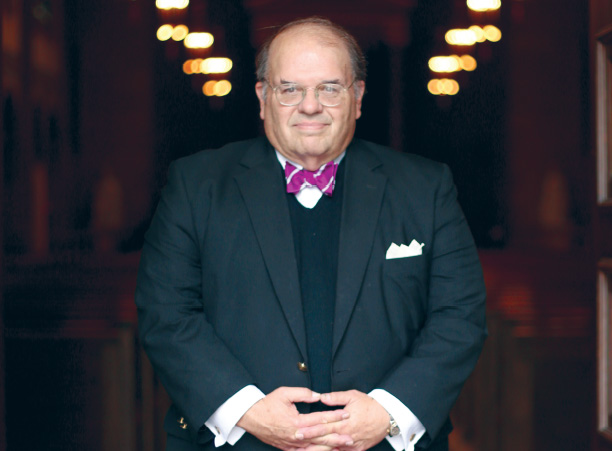
"A true Holy Cross man for others, your distinguished career has been a powerful blend of private practice and public service for more than four decades."
Hon. Richard J. "Dick" Leon '71 was appointed a U.S. District Judge for the District of Columbia by President George W. Bush in 2002 and has rendered opinions in some of the nation's most high-profile, historically significant and exceedingly complex cases. He's an independent jurist who has been described as "one of the most powerful men in Washington," yet when he arrived at Holy Cross, he had no aspirations for a career in law.
"I never expected to be a lawyer when I went to college," Leon says. "I took pre-dental classes, but didn't do so well. By my junior year, I was interested in teaching high school and coaching. I also took a criminology class that spring, which really intrigued me. So much so, that when a friend of my parents, who was a lawyer, encouraged me that summer to consider going to law school, I decided to take the law boards with my former roommate, Ed Joyce, that fall. The rest, as they say, is history!"
Today, Leon is counted among the 14 Holy Cross alumni who have been appointed by a president to serve on the federal bench. His distinguished career has been a high-powered mix of private practice, public service and enlightening the next generation of lawyers. After graduating at the top of his class from Suffolk Law School in 1974, he was named to highly competitive judicial clerkships and selected for the U.S. Justice Department's Honors Program. He was assigned to New York, where he served in the U.S. Attorney's Office for the Southern District of New York. In 1981, he earned a Master of Laws degree from Harvard Law School and served as a law professor at St. John's Law School.
In 1983, he moved to Washington, D.C., to serve as a tax prosecutor at the Department of Justice, and was later selected to serve in the first of a series of engagements as counsel to four different congressional committees. Three of those committees (Iran-Contra, October Surprise and Whitewater) conducted investigations of sitting U.S. presidents. In 1989, he went into private practice with the first of two prominent national law firms, and eight years later began serving as an adjunct professor at Georgetown University Law School, where he still teaches today. In 2001, President Bush nominated Leon to the federal bench; he was unanimously confirmed by the Senate in February 2002 and was sworn in by his classmate, Supreme Court Justice Clarence Thomas '71.
"I've had quite a few interesting cases," Leon says with resounding understatement. "Federal judges arrive on the bench with a lot to learn. It's a real trial by fire." He is quick, however, to praise his "great team of law clerks, including three of the four Holy Cross alumni" who have already served in his chambers.
Some of Leon's outsized cases have generated banner headlines and seven of his decisions have gone to the Supreme Court. In his first year on the court, he served on a three-judge panel charged with evaluating the largest First Amendment case in U.S. history: a challenge to the constitutionality of nearly two-dozen sections of the Bipartisan Campaign Reform Act. That panel issued a 1,800-page ruling in McConnell v. FEC, which was later upheld in large part by the Supreme Court, in what still stands as the longest opinion in its history. In 2008, he presided over the first Guantanamo detainee habeas merits trial and ruled in Boumediene v. Bush that five Algerians had been detained illegally and ordered them released. In 2013, he ruled in Klayman v. Obama that the National Security Agency's bulk collection of metadata from every cell phone user in the nation "likely violates the Fourth Amendment." Most recently, in 2018's US v. AT&T-Time Warner, he ruled against the U.S. Justice Department's attempt to block, on antitrust grounds, the $108 billion merger of AT&T with Time Warner.
Leon was the first in his family to attend college, but immersed himself in a wide range of campus activities, including playing varsity lacrosse. He received a Presidential Service Award. "My parents were my first mentors," he says. "My dad was a carpenter who worked very hard six-and-a-half days a week. My mother was a news junkie who loved to follow politics, so I learned from her to stay informed."
Leon emulates his father's strong work ethic, yet makes time in his challenging schedule to provide opportunities for Holy Cross alumni and students. He participates in events of various Holy Cross associations and additionally hosts a lunch at the federal courthouse each semester for Holy Cross students participating in the Washington Semester Program and alumni attending Georgetown Law School.
"My love for Holy Cross and the friends I made there has never wavered," Leon says. "It remains a special place for my wife, Christine, and me. We met at a mixer in the old Field House. We were married in 1973 in the Jesuit residence chapel. Our son, Nicholas, was baptized there in 1991. At virtually every stage of my life, Holy Cross friendships, old and new, have been critical not only to my success, but also to the enjoyment of my life."
Barbara Tylenda, Ph.D., ABPP '79
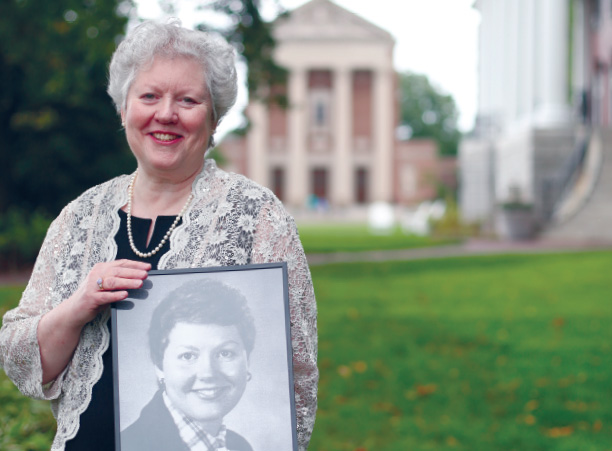
"You have been an unequalled advocate, exceptional practitioner, outstanding educator and brilliant researcher in support of the most vulnerable among us — children and adolescents with intellectual or developmental disabilities."
Barbara Tylenda, Ph.D., ABPP '79 remembers in sharp focus a pivotal childhood memory. At age 7, she witnessed her Uncle Bob, a parish priest, give his childhood bicycle to a heartbroken young boy whose new bike had been stolen. In that moment, she knew what she wanted to do for the rest of her life: help others.
For more than three decades, Tylenda has been doing exactly that as a trailblazer in the assessment, diagnosis and treatment of children with developmental disabilities and co-existing mental health disorders. A recognized leader in her field, she has been a fierce advocate for changing public perceptions, increasing understanding and improving access to opportunities for children with intellectual disability and autism spectrum disorder through her forward-thinking research, award-winning teaching and steady focus on the full appreciation of the whole child.
"Being a sharp detective with a developmental focus is essential when assessing these children," says Tylenda, chief psychologist and associate unit chief at Rhode Island's Center for Autism and Developmental Disabilities at the Emma Pendleton Bradley Hospital in Providence. Also a clinical professor of psychiatry and human behavior at Brown University's Warren Alpert Medical School, she is teaching the next generation of clinical child psychologists and child psychiatrists to be outstanding clinicians, and to better understand and advocate for their young patients. The Alpert Medical School has honored Tylenda's dedication with a 2004 Teaching Recognition Award, as well as 2008 and 2018 Dean's Teaching Excellence Awards. In addition to her many publications in peer-reviewed journals and wide-ranging presentations, she has written a children's book, "What Is Heaven, Babci?," which integrates her grandmother's – Babci's – comforting story about death into her therapy. The book, illustrated by Elizabeth Hamilton '04, begins the conversation.
Tylenda's deep faith and great admiration for her uncle explain, in part, why she chose the vital-but-difficult work she does on behalf of an often misunderstood and underserved population of children. "For me, it evolved into a question of how to be of service to others," she says. "My Uncle Bob was what psychologist Julius Segal would have called a 'charismatic adult,' a caring person with whom a child at risk can identify and from whom he or she can gather strength. The children who come to our inpatient program need to feel that we will act as advocates for them and help them find a new way forward."
Tylenda discovered her path to Holy Cross after reading an article about the Catholic Ivy League. "The College also was still transitioning into a fully coeducational institution; it was a place where new ground could be broken by strong, bright females," she says. She took a Greyhound bus — by herself — to visit campus for her admissions interview. Planning to double major in psychology and fine arts, she shared her portfolio with a studio art professor and met with Ogretta McNeil, the late dynamic chair of the psychology department. "Later, as I waited for a taxi at the top of the hill, I thought, 'This could work.' I was the first student formally admitted to Holy Cross as a double major. Things took off nicely for me there."
Tylenda wanted practical experience in tandem with her academic work, so she arranged an internship at Worcester Juvenile Court. "Two mornings a week for two years, I worked at the court with kids who had eye-popping challenges in their lives." She credits her Holy Cross mentors with providing wide latitude, wise counsel and unwavering support for her to construct the academic and hands-on professional experience she sought. Named a Fenwick Scholar her senior year, she created a yearlong program of independent study and travel in consultation with her mentors. "I was to attend the Jung Institute in Switzerland with the travel stipend I received," she explains. "The exchange rate dropped and I didn't have enough money for living expenses. Fr. Brooks generously wrote me a check to cover the deficit. I was so grateful."
McNeil, the College's first African-American faculty member to receive tenure, became Tylenda's adviser, principal mentor and guide for life. "She encouraged me to specialize in clinical child psychology as a career," she says. "Ogretta was tough and demanding, but also fair and caring — an exemplary role model as a teacher and a mentor. I have tried to emulate her with my own students. She was empathetic, reliable, encouraging, knowledgeable, enthusiastic and collaborative."
To finish her Ph.D. at Southern Illinois University, Tylenda was required to complete a yearlong clinical internship: "My plan was to specialize in neuropsychology. Instead, I was assigned to a unit for children with developmental disabilities. I opened myself up to the unanticipated experience and found these wonderful children. By reframing my acceptance of the situation, my career was enriched."
Arthur E. "Ned" Weyman, M.D., '62
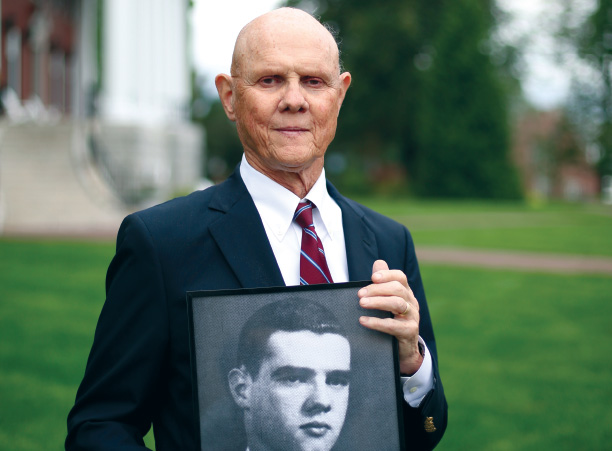
"You take everything to heart — and with good reason. A half-century ago, you were the visionary young physician who saw the life-saving potential of echocardiography as a noninvasive diagnostic tool for detecting heart disease."
Arthur E. "Ned" Weyman, M.D., '62 hated his quantitative chemistry class, so he dropped it. That decision took the then-sophomore out of the premed program – but only briefly, thanks to a withdrawal-from-course notice sent home, followed by a conversation with the dean and his father who, once alerted, drove to campus from New Jersey. Today, Weyman is a professor of medicine at Harvard Medical School, a brilliant researcher and a compassionate physician at Massachusetts General Hospital. As the pre-eminent leader in echocardiography, he has advocated tirelessly for international recognition of the pivotal role the noninvasive assessment tool plays in saving lives by quickly detecting cardiac issues in patients from infants to adults. In addition, his well-deserved reputation as a teacher and mentor has attracted young cardiologists worldwide to compete for two-year fellowships to train in his Boston lab.
"At dinner, after our meeting with the dean, I asked my dad why he was so mad," Weyman recalls. "I was back in class and would be reinstated in the premed program if I got a B for the semester. I said, 'You told me I could take any classes I wanted.' He responded, 'That's right, but once you start something, you can't quit in the middle.' That was a lesson I never forgot."
Weyman went on to medical school and a stellar career. "If you got Fr. Busam's recommendation, you got into medical school somewhere," he remembers. "When I showed him my acceptance letter, he suggested that I accept the offer 'as soon as possible before they change their minds.' If I hadn't gone to Holy Cross, I never would have become a doctor and I wouldn't have the life I have today."
He went on to the New Jersey College of Medicine and did an internship and first-year residency at St. Vincent's Hospital in New York. He then put his residency on hold while he served in the U.S. Navy as a Marine squadron and air group flight surgeon from 1968-1971. Weyman then returned to complete a second year and chief residency at St. Vincent's, followed by a three-year cardiology fellowship at Indiana University, where he found his calling. His first rotation landed him in the cardiography lab, where he immediately was impressed with the diagnosis potential of this technique.
At the end of his first-year fellowship, a prototype two-dimensional echo machine arrived at the lab, one of only three in the world at the time. "It was like a refrigerator on wheels," he says. "I loved it. I became very good with echo tests. Everything I observed was new. I was the first person to see an acute myocardial infarction as it was developing." No one else was interested, so it became his project and his passion. He always tells his fellows that "to be truly successful you have to be in the right place at the right time but, more importantly, you have to know you're there."
Weyman decided to take a risk and delay his return to New York where a job awaited. One year turned into seven. Promoted to associate professor of cardiology at Indiana by 1980, Mass General recruited him to be research director of its cardiac ultrasound laboratory and an associate professor at Harvard Medical School. Named Mass General's chief of cardiology in 1994, his development of innovative methods, research models and exemplary mentoring led the way for echocardiography to become the go-to assessment tool for heart and vascular imaging.
Weyman developed an echocardiography laboratory known for producing the widest range and highest quality of new information with active research programs in multiple areas. He also put into practice the Jesuit values that infused his experience at Holy Cross, where he says he grew up and learned to be a man for others. "I have worked with outstanding fellows from around the world. They come to us after they've finished their cardiac training because they're looking for their passion," he says. "I felt it was my obligation to help them find it."
Weyman's tremendous contributions to advancement in the diagnosis and treatment of cardiovascular disease through research, teaching and service have been recognized with a litany of honors. They include a 2001 American College of Cardiology Gifted Teacher Award and a University of Medicine and Dentistry of New Jersey 2004 Distinguished Alumnus Award. The American Society of Echocardiography's Arthur E. Weyman Young Investigator's Award was established by the National Board of Echocardiography to honor its first president.
A devoted family man, Weyman enjoys spending time with his wife, Jean, their four children and grandchildren. "At 77, I'm still spending time in the lab, nominally working full time," he says. "Life is good and I'm lucky. When you love what you're doing, it stops being work."
Photos by Tom Rettig
Written by Elizabeth Walker for the Winter 2019 issue of Holy Cross Magazine.
About Holy Cross Magazine
Holy Cross Magazine (HCM) is the quarterly alumni publication of the College of the Holy Cross. The award-winning publication is mailed to alumni and friends of the College and includes intriguing profiles, make-you-think features, alumni news, exclusive photos and more. Visit magazine.holycross.edu/about to contact HCM, submit alumni class notes, milestones, or letters to the editor.
Related Information: